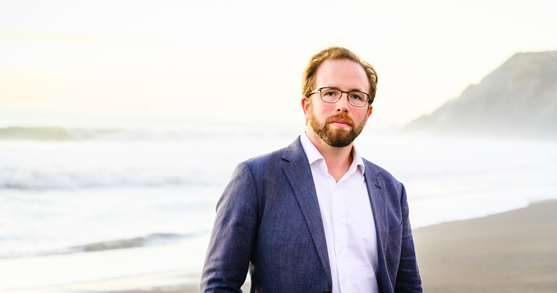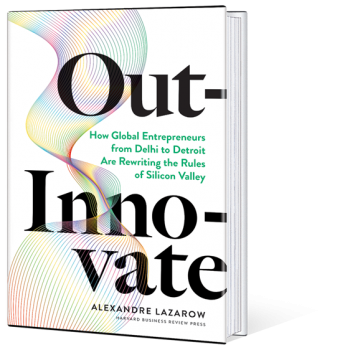
Alexandre Lazarow [BComm(Hons)/06]
Out-Innovate: Doing more with less
Asper alumnus identifies opportunities to Out-Innovate in the Covid-19 landscape
In Alexandre Lazarow’s [BComm(Hons)/06] new book Out-Innovate: How Global Entrepreneurs – from Delhi to Detroit – Are Rewriting the Rules of Silicon Valley he outlines where entrepreneurs outside the most-developed start-up ecosystems, are out-innovating their Silicon Valley counterparts. Creating their own systems and navigating their own pathways, entrepreneurs are defying assumptions about what the archetype for innovation should be, and re-calibrating what it means to innovate. The book champions the resilience of camels over the reliance on unicorns in the start-up ecosystem.
We recently connected with Lazarow to learn about his insights on the Covid-19 landscape.
As we navigate the current crisis, you discuss global entrepreneurs having to do more with less, and that being an advantage. Why?
So many early-stage companies, especially here in San Francisco, have become accustomed to burning through cash while still watching their valuations soar, all in the name of “blitzscaling,” but the problem with this strategy is that it leaves those companies vulnerable and ill-prepared for market shocks and downturns like the one we’re currently experiencing.
Outside of Silicon Valley, though, most companies have had to forgo the luxury of cheap, easy to access capital and loss-generating forgiveness. Instead, these companies in emerging ecosystems and markets all over the world have had to build businesses with less. This means that the business model is tested more frequently; its economics are under a finer microscope; and it has to get creative because the path to success is less trodden. That makes these start-ups (which I call “Camels” in my book because of their ability to survive harsh conditions, among other hardships) better positioned to withstand the market conditions of the current moment. They are usually closer to profitability if not already profitable, and they take strategic bets on growth that can often be paused without killing the business. By being lean to begin with, these Camels will be well-positioned to come out of this crisis in a better market position.
Silicon Valley has much to learn from them if they want to build long-lasting enterprises and avoid another bubble.

A number of things you mention resonate with cities like Winnipeg. As a former Winnipegger how did your roots influence your approach and career path?
As they say: “You can take the boy out of Winnipeg, but you can’t take Winnipeg out of the boy”. Actually, not sure they do say that.
Much of my formative young adult years were in Winnipeg, both in high school and while studying at the University of Manitoba Asper School of Business (Class of 2006). The experience instilled in me a deep sense of values, of place, and of grit. These have shaped every bit of my life and career, be it the types of businesses I seek to invest in or the types of entrepreneurs I search to partner with.
My heritage also deeply impacted this book. Winnipeggers are authentic, honest, hard working and often deeply humble. Like the innovators in my book, they do great things. In writing Out-Innovate I was telling the stories of Winnipeggers – both literally since I cover the story of Skip the Dishes and figuratively because of others who fit this mold.
In Out-Innovate you are optimistic about global entrepreneurs you dub “Creators,” individuals you identify as having the ability to solve some of the world’s most intractable problems. What makes someone a “Creator”?
In Silicon Valley, start-ups dream of being “disruptors,” a phrase that has taken on a life of its own; however, in emerging start-up ecosystems, entrepreneurs must be Creators–a title that manifests itself in three main ways:
- Creators offer a product or service which solves an unserved, acute pain point in the formal economy. Oftentimes, Creators bring legitimacy and formality to their industries.
- Creators don’t just offer their solutions to the top earners of a region. Instead, they design successful products for the mass market from day one.
- Creators are focused on innovations that reshape or rethink a market or sector. Technology often plays a key role in restructuring the business model, customer interaction, and operations.
Emerging start-up ecosystems are spawning many more Creators than Silicon Valley is. Innovators in these markets offer platforms in education, health care, transportation, and financial services to the mass market, where technological and business model innovations promise to successfully bridge historical gaps.
As we reckon with the consequences of Covid-19, the gaps in our society are laid bare. These are gaps, but also incredible opportunities for entrepreneurs to conceive of innovative solutions to solve them, in short to Create.
More information on Out-Innovate: How Global Entrepreneurs – from Delhi to Detroit – Are Rewriting the Rules of Silicon Valley published by Harvard Business Publishing can be found on Lazarow’s website: https://www.alexlazarow.com.






